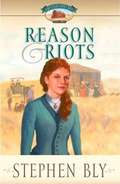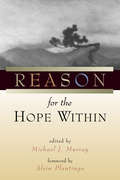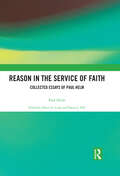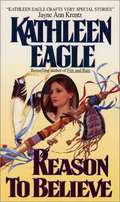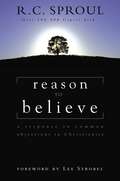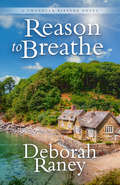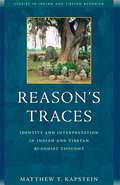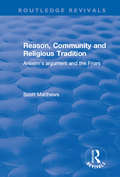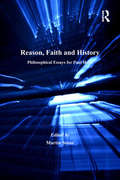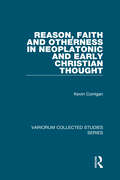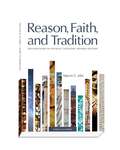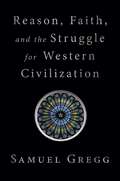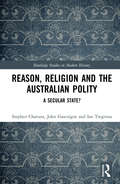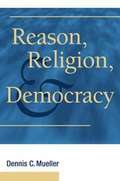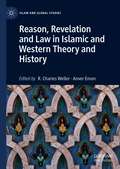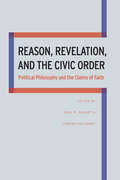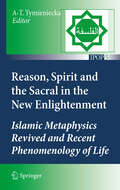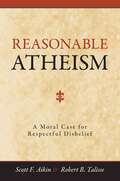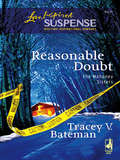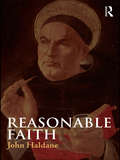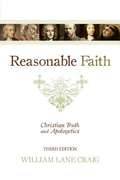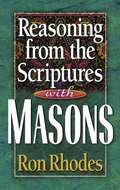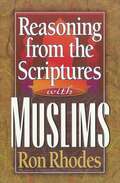- Table View
- List View
Reason and Reverence: Religious Humanism for the 21st Century
by William R. MurryThis book gives a short history and explains the beliefs of the Unitarian church.
Reason and Riots (Homestead #3)
by Stephen A. BlyWhen a boy is killed by a breakaway rail car, Jolie Bowers's compulsion to control is stretched to the limit. The homesteaders of western Nebraska threaten to retaliate against the railroad. And this is only the beginning. In the midst of teaching school, preparing for her wedding, and dealing with the violent reaction to the railroad accident, Jolie finds herself facing trouble from all sides. Mr. Avery shows up with legal papers demanding a return of the family homestead. Jolie's father, Matthew Bowers, is trying to pull together enough money to build the family the first house they've ever owned. Her mother, Lissa Bowers, is injured in a dynamite blast, and her sixteen-year-old brother decides to get married. Her little sister Essie's sweetheart, Leppy Verdue, is sentenced to be hanged, and fourteen-year-old Gibson is sidelined with the chicken pox in the hunt for an escaped criminal. Some would be depressed and crushed, but for Jolie it is a test of endurance and faith. And for the first time in her life, she doesn't know how things will end.
Reason for the Hope Within
by Michael J. MurrayDuring the last two decades there has been a renaissance in the field of Christian philosophy. Unfortunately, most of this excellent work has not reached general readers. Reason for the Hope Within was produced specifically to make available the best of contemporary Christian philosophy in a clear, accessible—and highly relevant—manner. Fourteen of America's rising Christian philosophers cover many of the traditional themes of Christian apologetics as well as topics of special relevance to today's world:the problem of evilthe possibility of miraclesthe existence of heaven and hellEastern religionsReligion and scienceChristianity and ethicsReason for the Hope Within provides readers with the most up-to-date resources for thinking about and defending the Christian faith. Contributors: Douglas Blount Robin Collins J. A. Cover William C. Davis Scott A. Davison Daniel Howard-Snyder Frances Howard-Snyder Trenton Merricks Caleb Miller Michael J. Murray Timothy O'Connor John O'Leary-Hawthorn Thomas D. Senor W. Christopher Stewart
Reason in the Service of Faith: Collected Essays of Paul Helm
by Paul HelmPaul Helm is a distinguished philosopher, with particular interests in the philosophy of religion. His work covers some of the most important aspects of the field as it has developed in the last thirty years with particular contributions to metaphysics, religious epistemology and philosophical theology. In celebration of Helm’s life’s work, Reason in the Service of Faith brings together a range of his essays which reflect these central concerns of his thought. Over thirty of Helm's selected essays and four unpublished articles are gathered into five parts: Metaphilosophical issues, Action, Change and Personal Identity, Epistemology, God and Creation, Providence and Prayer. The volume is prefaced with a short editorial introduction and ends with an extensive bibliography of Helm’s published works. Demonstrating the important connection between Helm’s theological and philosophical interests across his body of work, this collection is a remarkable resource for scholars of religion, philosophy and theology.
Reason to Believe
by Kathleen EagleYoung lovers from starkly different lives and worlds, Clara and Ben Pipestone came together in passion and in tenderness. But their marriage could not endure deception -- or the betrayals of a tormented, searching soul. And now, though time and pain have torn them apart, they reunite for the sake of their troubled teenaged daughter -- embarking upon a rugged winter journey across sacred land in symbolic remembrance of Ben's Lakota ancestors ... and to reclaim something beautiful but lost -- and as eternal as the stars.
Reason to Believe: A Response to Common Objections to Christianity
by Lee Strobel R. C. SproulDo Christians Have Good Answers for the Really Tough Questions? Dr. R. C. Sproul believes they do. In this unique book, he deals with the most common objections to the truths of the Christian faith, including: * Has science disproved the existence of God? * Will non-Christians who never hear of Christ go to hell? * Is it narrow-minded and bigoted to believe Christ is only one way to God? * Why do people need God when life is going smoothly? * Isn’t Christianity just a crutch for people who can’t handle life’s pressures? * Is heaven real or just “pie in the sky”? * Do Christians have a good answer to evil and suffering? * How does the church explain all its hypocrites? Reason to Believe is no collection of pat answers and proof texts. It addresses each objection in a separate chapter, which includes a special capsule summary that gives the kernel of each argument. This is a superb resource for those in visitation and calling programs, and a must for anyone who wants to do more than scratch the surface of Christian truths.
Reason to Breathe: The Breathing Series (A Chandler Sisters Novel #1)
by Deborah RaneyPhylicia thought life was passing her by, but maybe this was love's plan all along. . .At twenty-nine, Phylicia Chandler put her life on hold to care for her dying mother with her sisters, Joanna and Britt. Now Mom is gone and their father stuns them all by running off with a woman young enough to be their sister. Life is moving forward all around her, but Phylicia feels stuck--until her father's protégé, Quinn Mitchell, presents the sisters with an intriguing business opportunity to purchase a trio of cottages just outside of Langhorne, Missouri. Joanna and Britt are convinced the three of them should launch a vacation rental venture, but Phylicia remains skeptical.To complicate matters, Quinn soon finds himself falling hard for Phylicia. But how can he pursue this beautiful, talented woman twelve years his junior when she's still reeling over her father's hasty engagement to a younger woman? Quinn is determined to give Phylicia her happily-ever-after. But first, he must help her come to terms with her discovery of long-held family secrets and persuade her that true love can transcend their differences.
Reason's Traces
by Matthew KapsteinReason's Traces addresses some of the key questions in the study of Indian and Buddhist thought: the analysis of personal identity and of ultimate reality, the interpretation of Tantric texts and traditions, and Tibetan approaches to the interpretation of Indian sources. Drawing on a wide range of scholarship, Reason's Traces reflects current work in philosophical analysis and hermeneutics, inviting readers to explore in a Buddhist context the relationship between philosophy and traditions of spiritual exercise.
Reason, Community and Religious Tradition: Anselm's Argument and the Friars (Routledge Revivals)
by Scott MatthewsThis title was first published in 2001: Reason, Community and Religious Tradition examines key questions about the relationship of rationality to its contexts by tracing the early history of the so-called 'ontological' argument. The book follows Anselm's Proslogion from its origins in the private, devotional context of an eleventh-century monastery to its reception in the public and adversarial contexts of the friars' schools in the thirteenth century. Using unpublished manuscript evidence from the Dominican and Franciscan schools at Oxford, Paris and Bologna in the thirteenth century, Matthews argues that the debate over Anselm's argument embodied the broader religious differences between the Franciscan and Dominican communities. By comparing the most famous figures of the period with their lesser-known contemporaries, Matthews argues that the Friars thought as communities and developed as traditions as they developed their arguments. This book will interest anyone concerned with the nature of rationality, and its relationship to communities and traditions, and what this entails for rational debate across cultural divides. In particular, it offers a fresh perspective on traditional approaches to the rationality of religion and religious belief.
Reason, Faith and History: Philosophical Essays for Paul Helm
by M.W.F. StoneSpanning the breadth of philosophical, historical and theological interests articulated in the work of Paul Helm, including chapters on Calvinism, philosophical theology, philosophy of mind, Christian Doctrine and epistemology, Reason, Faith and History offers an accessible text for students of contemporary philosophy of religion as well as those interested in philosophical theology more broadly. Reason, Faith and History offers a unique collection of essays on key topics in the philosophy of religion. Published in honour of Paul Helm, a major force in contemporary English-speaking philosophy of religion, this book presents newly commissioned chapters by distinguished philosophers and theologians from North America, Israel, the UK and Continental Europe. Contributors include: Robertson, Trueman, Hughes, Swinburne, Torrance, Clark, Robinson, Pink, Gellman, Cross, Byrne, Hossack, and Crisp.
Reason, Faith and Otherness in Neoplatonic and Early Christian Thought (Variorum Collected Studies)
by Kevin CorriganThis book brings together a selection of Kevin Corrigan’s works published over the course of some 27 years. Its predominant theme is the encounter with otherness in ancient, medieval and modern thought and it ranges in scope from the Presocratics-through Plato, Aristotle, Plotinus and the late ancient period, on the one hand, and early Christian thought, especially Gregory of Nyssa, Augustine and, much later, Aquinas, on the other. Among the key questions examined are the relation between faith and reason; the nature of creation and insight, being and existence; literature, philosophy and the invention of the novel; personal, human and divine identity; the problem of evil (particularly here in Dostoevsky’s adaptation of a Platonic perspective); the character of ideas themselves; women saints in the early Church; love of God and love of neighbor; the development of Christian Trinitarian thinking; the strange notion of philosophy as prayer; and the mind/soul-body relation.
Reason, Faith, and Tradition: Explorations in Catholic Theology (Revised Edition)
by Martin C. AlblIs religious belief reasonable? Specifically, is the doctrine of the Catholic faith consistent with reason? Drawing on Catholic and Christian theological traditions, Martin Albl engages readers in theological thinking on various topics including the Trinity, Christology, ecclesiology, human nature, sin, salvation, revelation, and eschatology. Clear and focused, the text links traditional teaching with contemporary issues to show the relevance of faith to contemporary issues. A glossary, cross-referencing system, text and discussion questions, and footnotes with information about Internet resources provide more in-depth information.
Reason, Faith, and the Struggle for Western Civilization
by Samuel Gregg"Gregg's book is the closet thing I've encountered in a long time to a one-volume user's manual for operarting Western Civilization." —The Stream The genius of Western civilization is its unique synthesis of reason and faith. But today that synthesis is under attack—from the East by radical Islam (faith without reason) and from within the West itself by aggressive secularism (reason without faith). The stakes are incalculably high. The naïve and increasingly common assumption that reason and faith are incompatible is simply at odds with the facts of history. The revelation in the Hebrew Scriptures of a reasonable Creator imbued Judaism and Christianity with a conviction that the world is intelligible, leading to the flowering of reason and the invention of science in the West. It was no accident that the Enlightenment took place in the culture formed by the Jewish and Christian faiths. We can all see that faith without reason is benighted at best, fanatical and violent at worst. But too many forget that reason, stripped of faith, is subject to its own pathologies. A supposedly autonomous reason easily sinks into fanaticism, stifling dissent as bigoted and irrational and devouring the humane civilization fostered by the integration of reason and faith. The blood-soaked history of the twentieth century attests to the totalitarian forces unleashed by corrupted reason. But Samuel Gregg does more than lament the intellectual and spiritual ruin caused by the divorce of reason and faith. He shows that each of these foundational principles corrects the other’s excesses and enhances our comprehension of the truth in a continuous renewal of civilization. By recovering this balance, we can avoid a suicidal winner-take-all conflict between reason and faith and a future that will respect neither.
Reason, Religion and the Australian Polity: A Secular State? (Routledge Studies in Modern History)
by John Gascoigne Stephen A. Chavura Ian TregenzaHow did the concept of the secular state emerge and evolve in Australia and how has it impacted on its institutions? This is the most comprehensive study to date on the relationship between religion and the state in Australian history, focusing on the meaning of political secularity in a society that was from the beginning marked by a high degree of religious plurality. This book tracks the rise and fall of the established Church of England, the transition to plural establishments, the struggle for a public Christian-secular education system, and the eventual separation of church and state throughout the colonies. The study is unique in that it does not restrict its concern with religion to the churches but also examines how religious concepts and ideals infused apparently secular political and social thought and movements making the case that much Australian thought and institution building has had a sacral-secular quality. Social welfare reform, nationalism, and emerging conceptions of citizenship and civilization were heavily influenced by religious ideals, rendering problematic traditional linear narratives of secularisation as the decline of religion. Finally the book considers present day pluralist Australia and new understandings of state secularity in light of massive social changes over recent generations.
Reason, Religion, and Democracy
by Dennis C. MuellerThe rise of religious fundamentalism in different parts of the world in recent years and its association with terrorism has led to renewed interest in the nature of religion and its compatibility with Western institutions. Much of the focus of this new interest has contrasted religion and science as systems of knowledge. This book also emphasizes the difference between religion and science as means for understanding causal relationships, but it focuses much more heavily on the challenge religious extremism poses for liberal democratic institutions. The treatment contains a discussion of human psychology, describes the salient characteristics of all religions, and contrasts religion and science as systems of thought. Historical sketches are used to establish a link between modernity and the use of the human capacity for reasoning to advance human welfare. The book describes the conditions under which democratic institutions can advance human welfare, and the nature of constitutional rights as protectors of individual freedoms. Extremist religions are shown to pose a threat to liberal democracy, a threat that has implications for immigration and education policies and the definition of citizenship.
Reason, Revelation and Law in Islamic and Western Theory and History (Islam and Global Studies)
by R. Charles Weller Anver M. EmonThis book engages the diverse meanings and interpretations of Islamic and Western law which have affected people and societies across the globe, past and present, in correlation to the epistemological groundings of those meanings and interpretations. The volume takes a distinctively comparative approach, advancing dialogue on crucial transnational and global debates over the history of Western and Islamic approaches to law, politics and society and their relevance for today. It discusses how fundamental concepts are understood and even translated from one historical or political context or one semantic domain to another. The book provides focused studies of key figures and theories in a manageable, accessible format useful for specialized academic courses and research as well as general audiences.
Reason, Revelation, and the Civic Order: Political Philosophy and the Claims of Faith
by Carson HollowayWhile the dominant approaches to the current study of political philosophy are various, with some friendlier to religious belief than others, almost all place constraints on the philosophic and political role of revelation. Mainstream secular political theorists do not entirely disregard religion. But to the extent that they pay attention, their treatment of religious belief is seen more as a political or philosophic problem to be addressed rather than as a positive body of thought from which we might derive important insights about the nature of politics and the truth of the human condition. In a one-of-a-kind collection, DeHart and Holloway bring together leading scholars from various fields, including political science, philosophy, and theology, to challenge the prevailing orthodoxy and to demonstrate the role that religion can and does play in political life. Contributing authors include such important thinkers as Peter Augustine Lawler, Robert C. Koons, J. Budziszewski, Francis J. Beckwith, and James Stoner.
Reason, Spirit and the Sacral in the New Enlightenment
by Anna-Teresa TymienieckaRationality in its various expressions and innumerable applications sustains understanding and our sense of reality. It is traditionally differentiated according to its sources in the soul: in consciousness, in reason, in experience, and in elevation. Such a functional approach, however, leaves us searching for the common foundation harmonizing these rationalities. The perennial quest to resolve the aporias of rationality is finding in contemporary science's focus on origins, on the generative roots of reality, tantalizing hints as to how this may be accomplished. This project is enhanced by the wave of recent phenomenology/ontopoiesis of life, which reveals the workings of the logos at the root of beingness and all rationality, whereby we gaze upon the prospect of a New Enlightenment. In the rays of this vision the revival of the intuitions of classical Islamic metaphysics, particularly intuition of the continuity of beingness in the gradations of life, receive fresh confirmation.
Reasonable Atheism: A Moral Case For Respectful Disbelief
by Scott F. Aikin & Robert B. TalisseA recent poll from the University of Minnesota finds that atheists are America's least trusted social group. Perhaps compounding this negative impression is the attack-dog persona taken on in the past decade by the "New Atheists." Not only have they been quite public about their disbelief, but they've also stridently lambasted religious belief generally in a number of bestselling books. Disturbed by this negative public perception and the deterioration in the tone of open debate, the authors of this eminently reasonable work attempt to introduce a note of civility and rational clarity. To both religious believers and fellow atheists they counsel a measured approach that combines serious intellectual engagement with respect for the reasonableness of the other side's position. The heart of the book is the authors' moral case for atheism. Atheism, they contend, manifests a decidedly moral concern for others and their wellbeing. The authors further argue that atheism is driven by the kinds of moral considerations that should be familiar to all religious believers. Atheists are motivated by a moral concern for others, a desire to alleviate suffering and combat evil, and an appreciation for the value of life, freedom, and responsibility. In the end, the authors make not only a compelling case for atheism but also for the value and necessity of mutual respect in a democratic society composed of diverse citizens.
Reasonable Doubt
by Tracey V. BatemanWhen tragedy separated teen sweethearts Keri Mahoney and Justin Kramer, they promised to reunite someday. Now, fifteen years later, their meeting was bittersweet. After his wife's murder, Justin sought refuge with his twin sons at the childhood cabin in Missouri where he and Keri had first met. But Keri had become a police officer...and Justin might soon be facing a murder charge. Could past wrongs be forgotten and love rekindled as he and Keri joined forces to find the true killer, and prove Justin's innocence beyond a reasonable doubt?
Reasonable Faith
by John HaldaneIn this awaited follow up to his book Faithful Reason, the well-known philosopher and Catholic thinker John Haldane brings his unrivalled insight to bear on questions of the existence of God and the nature and destiny of the human soul. His arguments weave elements drawn from philosophy of mind, epistemology and aesthetics, together with recurrent features of human experience to create a structure that simultaneously frames and supports ideas such as that the cosmos is a creation, human beings transcend their material composition, and that human fulfilment lies beyond death. As in many of his other writings this volume blends themes from Aquinas with insights drawn from analytical philosophy and further establishes John Haldane as the leading 'analytical thomist'.
Reasonable Faith: Christian Truth and Apologetics
by William Lane Craig Craig William Lane<p>Perfect as a textbook yet excellent for lay readers, this updated edition builds a positive case for Christianity by applying the latest thought to core theological themes. <p>J. Gresham Machen once said, "False ideas are the greatest obstacles to the reception of the gospel"-which makes apologetics that much more important. Wanting to engage not just academics and pastors but Christian laypeople and seekers, William Lane Craig has revised and updated key sections in this third edition of his classic text to reflect the latest work in astrophysics, philosophy, probability calculus, the arguments for the existence of God, and Reformed epistemology. <p>His approach-that of positive apologetics-gives careful attention to crucial questions and concerns, including: the relationship of faith and reason, the existence of God, the problems of historical knowledge and miracles, the personal claims of Christ, and the historicity of the resurrection of Jesus. He shows that there is good reason to think Christianity is true. As Craig says, "If you have a sound and persuasive case for Christianity, you don't have to become an expert in comparative religions and Christian cults. A positive justification of the Christian faith automatically overwhelms all competing world views lacking an equally strong case."</p>
Reasonable Perspectives On Religion
by Richard CurtisAfter the surprising publishing success of the so-called New Atheists it has become clear that there is a market for critical discussions about religion. A religion is much more complex than a set of beliefs which cannot be proven, as the New Atheists argue. There is, in fact, much more to religion and much more to the arguments about its truth claims. This book seeks to bring together a range of discussions, both critical and apologetic, each of which examines some part of religion and its functions. Half of the contributors are critical of some element of religion and the other half are apologetic in nature, seeking to defend or extend some particular religious argument. Covering a wide range of topics, including ethics, religious pluralism, the existence of God, and reasonableness of Islam, these pieces have in common arguments that are made in careful and scholarly ways—they represent reasonable perspectives on a wide swath of contemporary religious debates, in contrast to the unreasonableness that creeps into discussions on religion in American society.
Reasoning From The Scriptures With Masons
by Ron RhodesDid you know that: The name of Jesus is removed from Masonic rituals to avoid offending anyone? The "secret" name of Masonry's god specifically includes Jehovah, Baal, and Osiris? Many people are unaware of the far-reaching impact the Masonic Lodge has today. Ron provides accurate information on the structure and beliefs of Masonry, then carefully contrasts its practices with Scripture. Continuing the easy-to-follow question-and-answer format of the Reasoning from the Scriptures series, this informative guide reveals the occultic symbolism, secret oaths, and hidden rituals that are an integral part of Masonic tradition. Readers will discover honest, fact-based insights on the dangers of this fraternal order and specific suggestions for sharing biblical truth with Masons.
Reasoning From The Scriptures With Muslims
by Ron Rhodes GossardAnyone interested in sharing the gospel with Muslim friends or understanding the doctrines and historical basis of Islam will appreciate this addition to the popular Reasoning from the Scriptures series. Using an easy-to-follow question-and-answer format, Reasoning from the Scriptures with Muslims covers issues, including... Muhammad and Jesus Christ—what are their roles? the Quran and the Bible—what kind of inspiration and authority do they have? Islam today—what different groups exist, and how can Muslims be reached with the good news? Each chapter examines a Muslim belief and compares it with biblical Christianity. Readers will find this an invaluable tool for discussing and sharing the words and life of Jesus Christ with Muslim friends and acquaintances.

